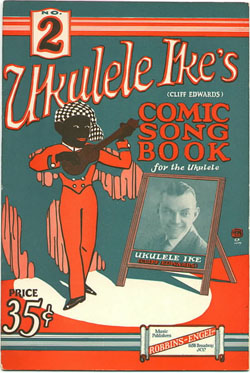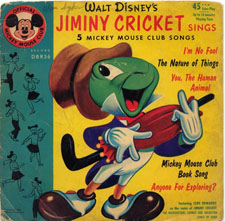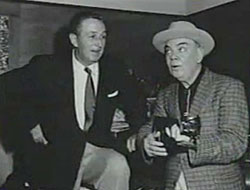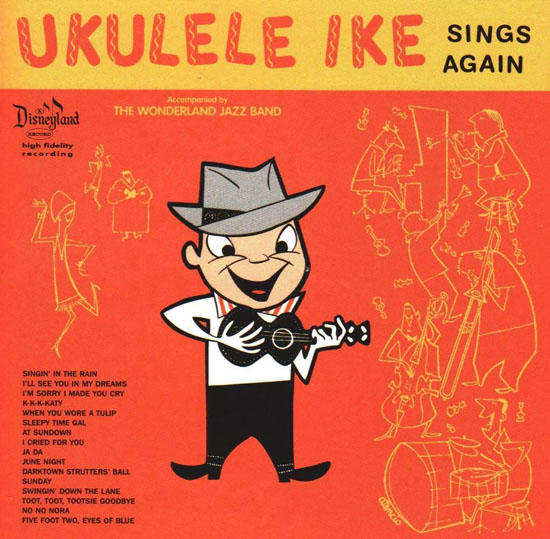
I love the voice of Cliff Edwards as Jiminy Cricket but unfortunately, the life of the talented performer was not a Disney fairy tale.
 For a brief time around 1922, Cliff Edwards teamed up with Lou Clayton doing a blackface act (that while grossly inappropriate and insensitive today was common practice for entertainment at the time) and received some recognition for achieving what one reviewer called a faithful degree of black speech nuances.
For a brief time around 1922, Cliff Edwards teamed up with Lou Clayton doing a blackface act (that while grossly inappropriate and insensitive today was common practice for entertainment at the time) and received some recognition for achieving what one reviewer called a faithful degree of black speech nuances.
That was one of the reasons that animator Ward Kimball cast Edwards as “Jim Crow” in Dumbo (1941). As Kimball remembered “We were recording the track for the Black Crows…and we got the Hall Johnson’s black choir from the Methodist church in Los Angeles for it and Cliff was the only white guy among them. Cliff Edwards doing the voice of Jim Crow really made the whole sequence, because he was quite adept at doing kazoo solos on his old records, and he could vocally imitate other instruments.
“Many of the instrumental effects on the track were done by Edwards. Voice-wise, he really sounded more black than the blacks we had backing him up…The development and differentiation of the (crow) characters really began on the night that we started recording. I decided that Jim Crow would be the big, dominating boss crow with the derby…By the time the voices were set, you have a pretty good idea how they would individually look, react and even function in the sequence.”
 Between 1923 and 1933, Edwards reportedly developed his weakness for cocaine and heroin. He was fond of chorus girls, alcohol, drugs and gambling. His three ex-wives left him bankrupt over the years. He also continued to perform in the Ziegfeld Follies and earned extra income by appearing on radio including being a frequent guest of the Rudy Vallee Show.
Between 1923 and 1933, Edwards reportedly developed his weakness for cocaine and heroin. He was fond of chorus girls, alcohol, drugs and gambling. His three ex-wives left him bankrupt over the years. He also continued to perform in the Ziegfeld Follies and earned extra income by appearing on radio including being a frequent guest of the Rudy Vallee Show.
Originally, the Disney storymen considered that Pinocchio’s sidekick should be a bothersome termite since Pinocchio was a little wooden puppet. Fortunately, one of the storymen pointed out that the original story contained a cricket.
From the Disney publicity material from 1940: “When time came to name the new cricket character, everybody around the studio sent in names like Abner or Marmaduke or Cedric, but Disney said one day: ‘Why not name him Jiminy? Everybody knows that expression, Jiminy Cricket.’ The name was a natural, of course, and stuck from that minute on.”
(“Jiminy Cricket” was a politically correct expression of surprise that replaced a much stronger J.C. name just as words like “fricking” replace a stronger more offensive word.)
 Edwards was the thirty-seventh person auditioned to do the voice of Jiminy. “At first, we made Jiminy sort of a pompous old fellow–kind of a windbag,” stated Walt Disney. However, once Edwards was cast, Walt said that Edwards’ smooth, upbeat performance had “so much life and fun in it that we altered the character to conform with the voice. Thus Jiminy comes to screen…lively and full of funny quips.”
Edwards was the thirty-seventh person auditioned to do the voice of Jiminy. “At first, we made Jiminy sort of a pompous old fellow–kind of a windbag,” stated Walt Disney. However, once Edwards was cast, Walt said that Edwards’ smooth, upbeat performance had “so much life and fun in it that we altered the character to conform with the voice. Thus Jiminy comes to screen…lively and full of funny quips.”
Throughout most of the 1940s, Edwards was considered a show business has-been, although he did have a successful two year musical tour of Australia and the South Seas Islands. When he returned, he unsuccessfully tried to launch a nightclub career.
His work as the voice of Jiminy Cricket helped sustain him through the 1950s.
The Disney Studio used Edwards as the voice of Jiminy Cricket on several animated short segments on the original Mickey Mouse Club television show including the “I’m No Fool”, “Encyclopedia specials”, “Nature of Things” and “You (Are a Human Animal)” series but the money seemed to slip right through his fingers.
He appeared in person several times to entertain the Mouseketeers including guest star appearances on November 15, 1955, February 21, 1956 and November 20, 1956 shows.
In addition, Jiminy was the master of ceremonies on several of the hour long Disneyland television shows. (In later years, his function was taken over by Ludwig Von Drake.) Edwards also provided the voice for Jiminy for commercials including Baker’s Instant Chocolate (which was one of the sponsors for The Mickey Mouse Club show) and American Motors (one of the sponsors of the Disneyland televsion show).
As Jimmy Johnson, the man in charge of Disneyland Records remembered, “I recorded Cliff as the Cricket on some of our Disneyland Records and he was paid royalties for those. But in his declining years—for Cliff was declining right before our eyes–I made some work for him on records which we really didn’t need. Toward the end, royalties from records were his only source of income. The last time he came into my office, he didn’t seem to know where he was or who I was. He was a sad and sorrowful sight that brought tears to my eyes. His housekeeper steered him out to her car. I never saw him again as he died shortly afterward.”
“When they’d be expecting him for a shooting, he wouldn’t show up. The booze just got to him,” remembered Disney Legend Ward Kimball.
 In his last years, Edwards sometimes spent his days hanging around the Disney Studio lot in hopes of more work and was occasionally taken to lunch by animators eager to hear his tales of the golden age of vaudeville.
In his last years, Edwards sometimes spent his days hanging around the Disney Studio lot in hopes of more work and was occasionally taken to lunch by animators eager to hear his tales of the golden age of vaudeville.
He was no longer officially employed by Disney when he entered a nursing home in Hollywood in 1969 as a charity patient supported by the Actor’s Fund. The Disney Company quietly paid Edwards’ medical expenses as well.
At the time of his death from a heart attack at the Virgil Convalescent Hospital on July 17, 1971 at the age of seventy-six, Edwards’ passing wasn’t reported to the public for several days because hospital officials didn’t consider it newsworthy since they didn’t know he had ever been famous.
His body was initially unclaimed and donated to the University of California, Los Angeles medical school. When Walt Disney Productions, which had been paying many of his medical expenses, found out about this, it offered to purchase the corpse and pay for the burial.
The Actors Fund of America and the Motion Picture and Television Relief Fund paid for the burial instead. A spokesman for the Actors’ Fund, Iggie Wolfington, said at the time, “I can’t praise [Walt] Disney Productions enough for the way they continued over the years to look out for Mr. Edwards’ well-being.”
Thirteen years after Edwards’ death, Disney provided a marker for the performer’s grave when the lack of a proper headstone was reportedly brought to the company’s attention by the Ukulele Society of America. In addition to his name and years of life, the marker simply reads, “In loving memory of Ukulele Ike.”
Jimmy Johnson in his unpublished autobiography wrote, “Cliff was a warm and wonderful man with never a sour word about anything or anybody. I cherish my memories of him.”
In 2002, Edwards’ original 1940 recording on Victor records of “When You Wish Upon a Star” was inducted into the Grammy Hall of Fame. “He made that song,” remembered Kimball fondly.



 Jim Korkis is an internationally respected animation historian who in recent years has devoted his attention to the many worlds of Disney. He was a columnist for a variety of animation magazines. With his former writing partner, John Cawley, he authored several animation related books including The Encyclopedia of Cartoon Superstars, How to Create Animation, Cartoon Confidential and Get Animated’s Animation Art Buyer’s Guide. He taught animation classes at the Disney Institute in Florida as well as instructing classes on acting and animation history for Disney Feature Animation: Florida.
Jim Korkis is an internationally respected animation historian who in recent years has devoted his attention to the many worlds of Disney. He was a columnist for a variety of animation magazines. With his former writing partner, John Cawley, he authored several animation related books including The Encyclopedia of Cartoon Superstars, How to Create Animation, Cartoon Confidential and Get Animated’s Animation Art Buyer’s Guide. He taught animation classes at the Disney Institute in Florida as well as instructing classes on acting and animation history for Disney Feature Animation: Florida.




















































What a sad tale. I’ve known about Cliff Edwards for years, but was not aware of his personal history. “When You Wish Upon a Star” is, I dare say, one of the greatest songs in movie history, and it wouldn’t be what it is were it not for Edwards’ sweet, beautiful tenor voice. It had a timbre that was unique — instantly recognizable. No other vocalist sounded like him.
Thanks so much for posting this.
Interesting that the article above does not mention his earlier Hollywood career in such films as THE HOLLYWOOD REVUE OF 1929 and such, which is where a great many people first heard of Cliff Edwards. He also introduced the classic song “Singin’ in the Rain” in HR, which was mentioned by Frank Sinatra at the beginning of THAT’S ENTERTAINMENT!
Cliff’s “scat” singing in the 1920s was a Ukelele Ike trademark. He used a lot of it in the “When I See An Elephant Fly” sequence in DUMBO. Keep in mind that he was not on salary at Disney, but was paid session for all his voice work. Therefore royalties, residuals and extra money would have meant quite a lot to him. Jim, why don’t you tell the story of what happened to Bobby Driscoll? There’s a real Disney tragedy! Thanks for this Cliff Edwards one.
Lord knows that’s a story that’s worth telling Mark.
Cliff was teamed with Buster Keaton for three early MGM talkie comedies. Buster also played the ukulele, and they played a duet in Doughboys (1930). Cliff and Buster had a great rapport on camera.
There is a lot to Cliff Edward’s story. Jim rightly focused only on his work with Disney. My favorite career detour for Edwards was his role as western sidekick to Charles Starrett and Tim Holt during the war years.
Not only were Buster Keaton and Cliff Edwards both employed by MGM in 1930,
they were also good pals and drinking buddies.
Here’s their enjoyable ukulele duet from Doughboys:
https://www.youtube.com/watch?v=MfVK_Z5htB4
I have the latter of the two VHS tapes of FUN AND FANCY FREE. The latter release includes a “making of…” bonus which shows Cliff performing the title song on THE MICKEY MOUSE CLUB. Although it was performed much faster on the TV show, it was great to see Cliff’s facial expressions as he sang the song! :-)!
Incidentally, Ward Kimball was mistaken on one point: He said that Edwards played a kazoo on his old records. No, he did not! Those sounds were Cliff’s own voice, doing vocal sound effects–what came to be known as “scat” singing! I believe that he created the efffect!
Having collected 78-rpm records for some 55 years, I have several dozen of Cliff’s discs recorded from the 1920s through the 1950s.
Always loved this tune from the Mickey Mouse Club myself…
https://www.youtube.com/watch?v=4IVyM1nTxS4
I remember seeing Cliff Edwards wandering around the Walt Disney Studio lot back in the fifties. He wasn’t always working. He seemed to like just hanging around the studio.
Edwards also turns up in some of those musical two-reelers from the Warner Archive, and played a detective’s sidekick in “The Falcon Strikes Back.” For a performer forgotten in his own lifetime he was pretty busy.
That’s a very sad tale, but it’s good to know that Disney and others were looking out for him when the chips fell. As someone else noted, his voice was unique, one of the clearest tenors in popular music. When I hear “When You Wish…” I am always astounded at that final note with such clarity and subtlety. Thank you, Jim, for the story.
Besides popularizing the ukulele at the start of the jazz age, Cliff Edwards is often hailed by music historians as one of the pioneers of jazz singing. His hot, breezy style was a major influence on the young Bing Crosby.
I’ve got recordings of “When You Wish Upon a Star” by Cliff Edwards on Victor and Decca 78s and a 1950s remake on a Coral 45. Never knew about the Coral rerecording until I found the disc in a used record store.
I like how the cartoon of Cliff on the old Disneyland Records LP cover resembles Jiminy Cricket.
Love the scene in Doughboys in which Ukelele Ike sings and Buster Keaton plays the uke.
Drugs, drink, broads and bones. But still, that talent shone through.
So nice to learn of Mr. Edwards history. This is what Cartoon Research is all about to me. Thanks Jim.
Cliff Edwards is great. His music from the 20s and 30s is absolutely amazing. Check out the LP “Im a Bear in a Lady’s Boudoir”.
Sad yet one should focus on the good; Cliff Edwards was truly a great performer, thoroughly unique – – – MGM pissed away the talent of Buster Keaton, the two should have been left to make a flurry of films together, they were a perfect duo.
Cliff on his own contributed quite a lot but oh if only some far sighted producer had seen his potential. It is nice getting driblets but one wants a flood.
Cliff Edwards was a genius! His “when you wish upon a star” is a fitting legacy to a kind, troubled man and human being. Knowing his story only serves to appreciate this song much more.
he was in gwtw or his voice was hes the dying shoulder talking about home to scarlette and meleinie